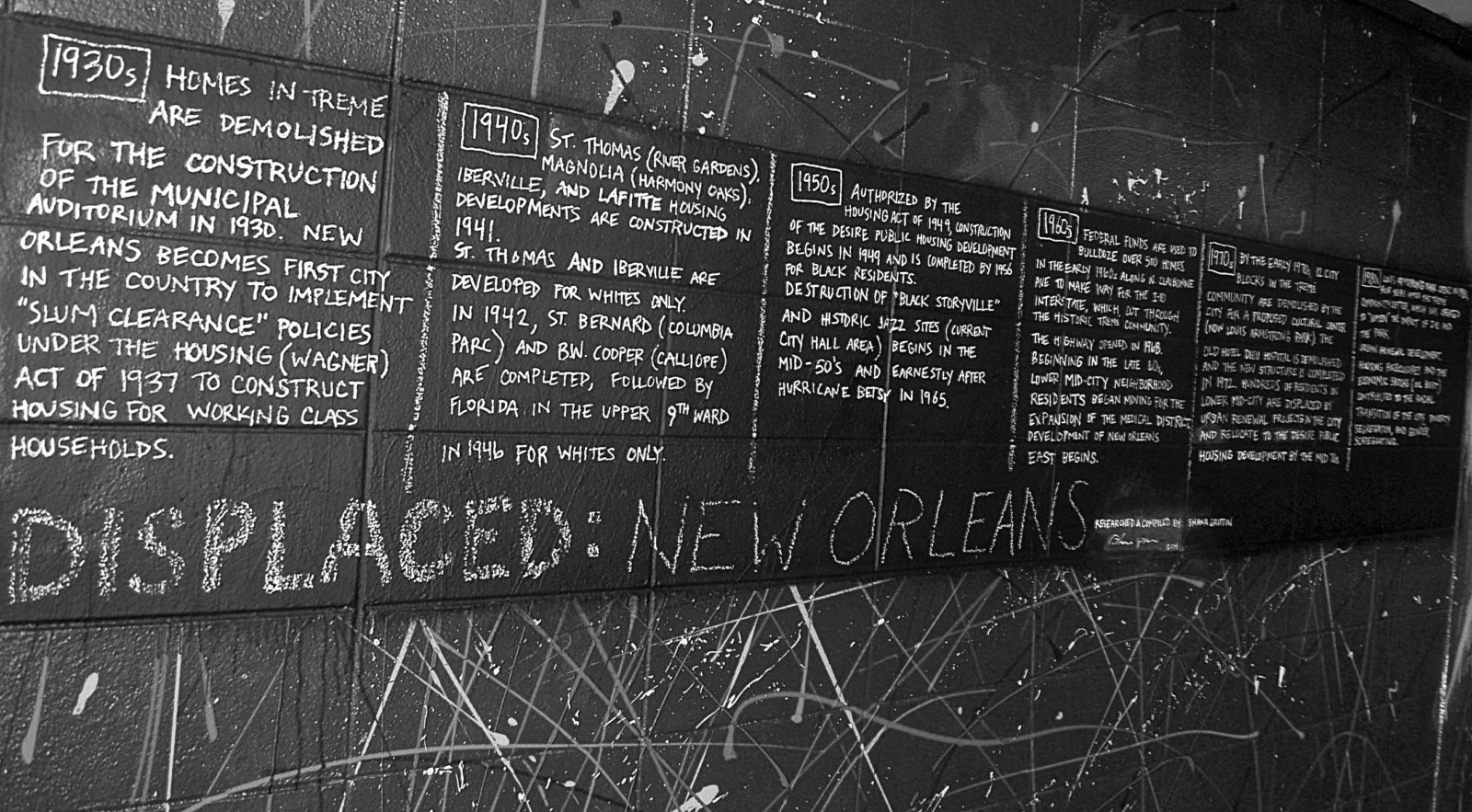- Pointe-Au-Chien Indian Tribe
- Morgan Adamson
- Ravi Agarwal
- Bruce Braun
- Geneva Lebouf
- Sarah Lewison
- Grace Treffinger
- Shana M. griffin
Seminar: Claims/Property
Making and Unmaking Property in the Anthropocene
Claims on property have embroiled the Mississippi region in a host of historic tensions and intractable legacies of violent injustice. This seminar engages the complicated entanglements of property claims that cut across the social, racial, and ecological landscapes of the Mississippi Delta, while connecting them to upriver struggles, as well as to the meaning of the Anthropocene itself.
Read Moreby Shana M. griffin
- contributionSarah Lewison
Measuring Loss
In response to the complicated entanglements of property claims in the Mississippi Delta, Sarah Lewison advocates for witnessing injustice as a way of preparing for repair.
Conversation, Engagement, Reflection, Field Study, Sensing, Storytelling, Teaching, Agency, Architecture, Commodities, Capitalism, Environmental Justice, Extraction, History, Indigenous Rights, Inequality, Race, Slavery
- contributionRavi Agarwal
Lost Voices
On the shared experiences of those who live along the Mississippi in New Orleans and the Yamuna in Delhi, reciprocal relationships with nature, and the importance of listening in the Anthropocene.
Engagement, Reflection, Conversation, Capitalism, Education, Human-environment relations, Naturecultures, Water
- Field Notet.simone.gaClaims and Property
My great-great grandmother was property. A fetish commodity and the technology through which other humans and public and private enterprises accelerated this anthropocenic epoch. Having at one time been property, today was extremely heavy. Not only the moving through the city but that one of our group members could not be accommodated and therefore could not move with us. Value valuelessness confinement disposability. I find myself a bit stuck tonight. I hope that we can see the lingering and far reaching effects of racial capitalism and its relationship to the Anthropocene. I hope that we see the the racism and ableism within the environmental injustices we witness and participate in. I hope we see that New Orleans is here but that New Orleans is also everywhere.#15581
New Orleans, Louisiana, USA
- Field Notefriederike.landau
#15640
New Orleans, Louisiana, USA
Sensing, Storytelling, Reflection, Conversation, Affect, Agency, Anthropos, Capitalism, Consensus, Contingency, Epistemology, Ethics, Representation, Sharing economy, Extraction
- Field Noteunderhil
#15656
New Orleans, Louisiana, USA
Sensing, Monitoring, Climate change, Geo-engineering, Imaginary, Slavery, Cosmologies, Air, Transport
- Roberto E. Barrios, Governing Affect: Neoliberalism and Disaster Reconstruction, University of Nebraska Press, 2017.
Robert D. Bullard, Race Place, and Environmental Justice After Hurricane Katrina: Struggles to Reclaim, Rebuild, and Revitalize New Orleans and the Gulf Coast, Westview Press, 2009.
Robert D. Bullard, The Wrong Complexion for Protection: How the Government Response to Disaster Endangers African American Communities, NYU Press, 2012.
Richard Campanella, Delta Urbanism: New Orleans, Routledge, 2010.
Cheryl I. Harris, “Whiteness as Property,” Harvard Law Review, 1993.
Rashauna Johnson, Slavery’s Metropolis: Unfree Labor in New Orleans during the Age of Revolutions, Cambridge University Press, 2016.
Walter Johnson, River of Dark Dreams. Slavery and Empire in the Cotton Kingdom, Harvard University Press, 2017.
Sarah Kanouse (ed.), Beyond Property, Field Station/HKW/MPIWG, 2019, personal website.
Katherine McKittrick, “On Plantations, Prisons, and a Black Sense of Place,” Journal of Social and Cultural Geography, 2011.
Katherine McKittrick, “Plantation Futures,” for Small Axe: A Caribbean Platform for Criticism, November 2013.
Katherine McKittrick, Clyde Woods (eds.), Black Geographies and the Politics of Place, South End Press, 2007.
Katherine McKittrick, Demonic Grounds. Black Women and the Cartographies of Struggle, University of Minnesota Press, 2006.
Robert Nichols, “Theft is Property! The Recursive Logic of Dispossession,” Political Theory, 2017.
Mark Rifkin, Fictions of Land and Flesh. Blackness, Indigeneity, Speculation, Duke University Press, 2019.
Christina Sharpe, In the Wake. On Blackness and Being, Duke University Press, 2016.
Julietta Singh, “Coda. Surviving Mastery,” Unthinking Mastery. Dehumanism and Decolonial Entanglements, Duke University Press, 2018.
Andrew Sluyter et. al, Hispanic and Latino New Orleans. Immigration and Identity since the Eighteenth Century, LSU Press, 2015.
Rebecca Solnit, Rebecca Snedeker, Unfathomable City: A New Orleans Atlas, University of California Press, 2013.
Erik Stokstad, “Louisiana’s Wetlands Struggle for Survival,” Science, 2005.
Samuel Stein, Capital City: Gentrification and the Real Estate State, Verso, 2019.
Albert Thrasher, On to New Orleans!: Louisiana’s heroic 1811 slave revolt, Cypress Press, 1996.
Clyde Woods, “Thought I Heard Samba Bambara Say: The Social Construction of New Orleans,” “The Disaster before the Disaster: Oil Regimes, Plantation Economics, and the Southern Strategy, 1977–2005,” “The New Urban Crisis: Katrina Time and the Planned Abandonment Movement,” in Pulido, Camp (eds.) Development Drowned and Reborn. The Blues and Bourbon Restorations in Post-Katrina New Orleans, University of Georgia Press, 2017.
Kathryn Yusoff, A Billion Black Anthropocenes or None , University of Minnesota Press, 2018.
Restore The Mississippi River Delta, mississippiriverdelta.org, project website.
Program details
Seminar Slot II: November 13–15, 2019
Conveners
Morgan Adamson
Bruce Braun
Shana M. griffin
Sarah Lewison (primary organizer)
Grace Treffinger
Experts
Ravi Agarwal
Geneva LeBeouf and the Pointe-au-Chien Indian Tribe (PACIT)
Laura D. Kelley

